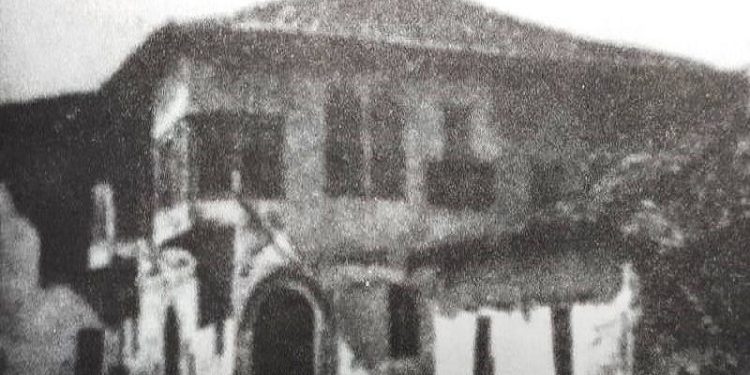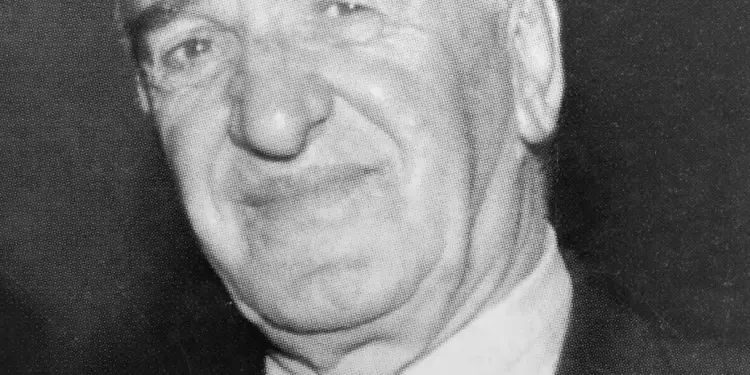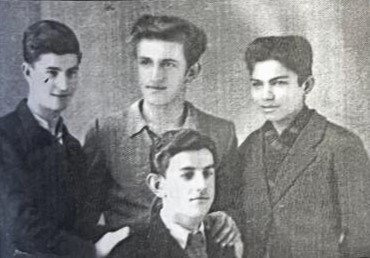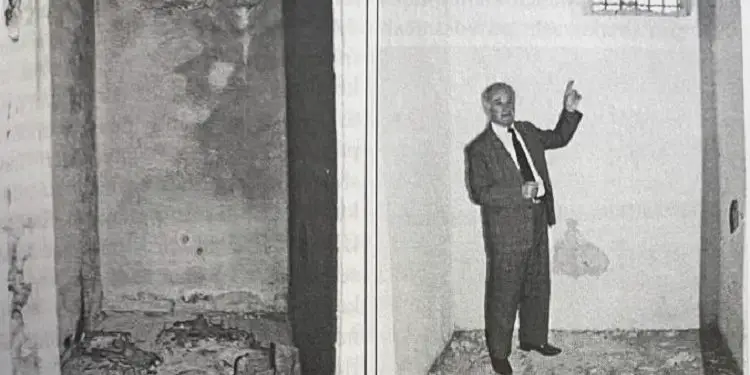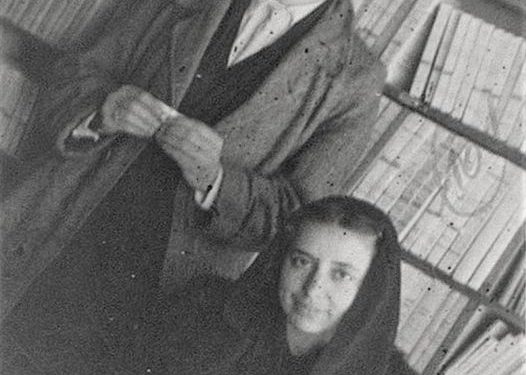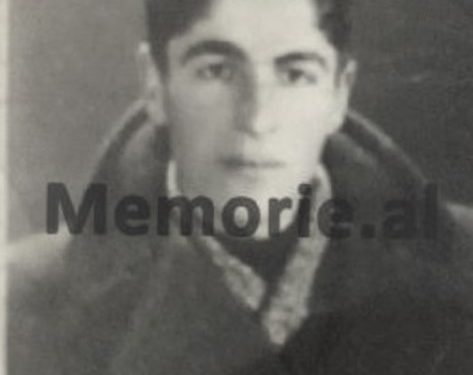By Ahmet Bushati
Part forty-one
Memorie.al/ After the flag was altered in 1944 with the addition of the communist star, Shkodra transformed into a center of resistance against the regime, paying a high price for its tradition of freedom. By April 1945, high school students, already feeling betrayed by the promises of the war, gathered to oppose the new terror that imprisoned and killed innocent people. Communism turned Kosovo into a province of Yugoslavia, while Shkodra was punished for its “historical crime”- its defiance against invaders. The “Postriba Movement” became a tool to suppress all dissent, plunging the city into an unprecedented spiral of suffering: imprisonments, executions, and the destruction of families. The high school students, alongside citizens, became symbols of resistance, while some “young communists” turned into tools of the State Security, leading to expulsions, imprisonments, and internments.
Four times, Shkodra rose in armed rebellion, but history forgot these battles. This book is written to remember the countless prisoners, the tortured, the killed, and the parents who suffered in silence. It is a warning against dictatorship and a plea for future generations not to forget the sacrifices made for freedom.
Continued from the previous issue
In the Footsteps of a Diary
Pjerin, Nushi and their friends would feel very proud and enthusiastic about the courage they had shown in court. Nushi would tell me in detail how they had discredited Enver Hoxha and the Central Committee, for all the evils they had brought to the country until then. The climax, as after them, had been when Pjerin Kçira, as a former Sigurimi officer, had denounced the Sigurimi itself as the author of bringing weapons into the church, thus freeing the Church for the first time and publicly from a serious accusation, which had made a great impression on those present in the hall. Among other things, Nushi would tell me how the respected teacher Meliha Dervishi, – wife of the imprisoned Qazim Dervishi – had approached them and, enthusiastic about their stance in that trial, had told them: “You are heroes”! Finally, Pjerin Kçira was sentenced to twenty years in prison, while the others to less.
Not even a few days would pass and their trial – due to the great furor it had caused among the people, related to the denunciation of Pjerin Kçira – along with its decisions, would be annulled and another judicial body, military and not civilian as until then, would try them from the beginning and, ultimately, punish them more severely than they had been sentenced the first time, and Pjerin himself, with death. And when they, that late afternoon, returned from this last trial, Pierini, without wasting a single minute of time, would call me and say: “Pierini to death”! which actually made a great impression on me, but which I, for the purpose of encouragement, would say to him as if with indifference that;
“Such a decision would never be implemented”, mainly because of his young age, and because that decision had been made formally, just to keep the people in check, who, taking advantage of the somewhat liberalized climate, could bring some concern to them, my other words, which would not have affected the quiet and courageous Pjerini at all, because he, as he himself would say, knew the communists better than anyone else, which would also be shown by the answer he gave me on the spot: “No, no, they never change the death sentence, that’s why this second trial was held, so that they could sentence me to death. They will never forgive me for the disclosure I made to them about bringing weapons into the church. Don’t worry, I’ve done enough to scare them”!
I do not know in what Albanian language these wonderful words of Pjerin Kçira should be translated, “ tombstone ” for a young man who was about to die, such sincere words, among the last of his young life, that they might deserve, if not praise and pain from some eternally angry, at least the just and humane judgment from everyone without exception. His certainty that he would be executed and the calmness with which he spoke about it, proved once again that he, not only was not afraid of it, but also that he was going to “expiate” (expiation of sins), without compromise or hesitation, with determination until the end. In his “telephone” conversations, from dungeon to dungeon, he had several times shown his deep regret for his communist past and, in the Security.
I had no idea that those two or three short conversations I had with him that late afternoon would be the last. Without realizing it, in the dark, Pjerin was suddenly taken to the Gestapo prison, never to see him again. After we had also been sentenced and sent to the New Prison, I would hear with pain that Pjerin had been shot, about two months later, that is, somewhere towards the end of that August.
About the last day of Pjerin Kçira’s life in the Gestapo prison, a certain Ndue Lalet from Mirditet would tell me, at first, that he too had been sentenced to death, and in the same prison as Pjerin, but not in the same prison cell with him. As I see it, Ruzhdi Rroji would speak to me after a few days, and so would someone else, but Gjon Ljarja, who had only been separated from Pjerin in the Gestapo prison by a curtain, would speak to me in more detail: “On the eve of the last day, Rasim Dedja – who was the head of the Sigurimi at the time – and Ali Xhunga later came to Pjerin, who informed him that the request for his life that the family had made had not been taken into account. They had also informed him of the time at which he would shoot them that night.
There, around lunchtime, they brought his mother and fiancée to a final meeting, and while they would cry bitterly during the meeting and, while kissing Pjerin’s clothes down to his ankles, Pjerin, for his part, constantly tried to encourage them, they said: “Don’t cry, don’t cry, don’t feel anything, because my friends will take revenge on me”!
After John told me how his brother, Biku, from Gomsiqe, where he was a teacher, had also arrived there for lunch, he would continue to tell me that at that time he himself was in a prison cell with Lin Sallaku, a mirditor. “With the persistent urging of Lin, who was very upset that day, I finally agreed to climb on the back of that mirditor and from the bars above the door, to ask Pjerini, about the arrival of those officers at midnight. Pjerini explained to me their words regarding the shooting that would be done late in the evening”. And Gjoni would continue: “During the afternoon, we could hear him singing in a low voice, the national anthem. Before midnight they took him out of the room to take him to be shot. As soon as Pjerini went out into the prison corridor, he shouted loudly two or three times, “Farewell, comrades, make me lawful! Farewell, comrades”! – he shouted even more loudly when they dueled in the prison yard and again when they were putting him in the car that was taking him to Zalë i Kirit!
Regarding Pjerini’s past as an investigator for thirteen months in a row, I and no one can exclude him from the violence that he may have used on the victims, so that they would have approached him to investigate them, because otherwise, he would not have been a Sigurimi investigator. However, there were also former people prosecuted by him, who have claimed that he did not use violence on them, and one of them would be Ruzhdi Rroji. Matish Cefa would also confirm such a thing to me, as he was interested in his former classmate and banker at the Fretënve School. Father Leon Kabashi, would have the best words for his former student, Pjerini, at the Fretënve School, and that for his act of sacrifice for the benefit and honor of the Church, he would write six pages of notebooks, where he would even call Pjerini a hero.
Father Leon once described to me in a friendly way an incident when he was giving mass in the Church of the Friars, in 1991, and as he was preaching, suddenly, Pierini appeared to him, under a special and divine light, from which he was stunned without knowing what was happening to him, and he would experience emotions even after two or three years later, when he tried to tell me, without being able to explain that incident properly, for the very impossibility of explaining it, according to Father Leon himself.
No one in Shkodra has to be harsh with her worthy son, because he served the dictatorship for about thirteen months, as a Sigurimi officer. It was his deep and sincere remorse, as a result of his tormented conscience, that, in order to atone for an unintentional mistake of his youth, he had led him to fight the communist government, for which he would later endure with dignity several months of imprisonment and interrogation, defying a savage and vengeful government, when in court – regardless of the consequences – he would more courageously make that famous statement of his, after which he would then calmly await death, at a time when he had only twenty-four or twenty-five years to live.
We also owe a few words to Bajram Bajraktari, who was imprisoned in Shkodra and is now buried there!
Bajram Bajraktari, the younger brother of Muharrem Bajraktari, had attended and graduated from high school in Rome with a gold medal, and dropped out of university after three years to study law, returning to Albania alongside his brother, Muharrem, to fight the Italian invaders. Bajram Baraktari had been wounded four times: first in a fight with fascist militias, twice more in battles with Albanian partisans, and one last time, when, together with his brother’s group, he was trying to cross the Macedonian-Greek border by force, when, after two days of fighting, Muharrem Bajraktari managed to escape to Greece, but after leaving 22 of his brave men dead and Bajram seriously wounded, he was captured by Macedonian partisans.
All those who were in the same prison cell as Bajram Bajraktari would have the best words for him, and one of them was Gjon Ljarja, who would convey Bajram’s words to us like this: “The Yugoslavs kept me in a prison in Belgrade for some time. I constantly begged the officials of those prisons to send me back to Albania and they, in all cases, would tell me that in Albania I would have a worse job than in their country, which I never believed, and that several times I would answer them; ‘It doesn’t matter, they are my brothers'”! Finally, John would continue with Bajram’s words: “They, considering my constant prayers, one day brought me to Kukës, where God knows what I have endured from the tortures they have inflicted on me for a month in a row. For a long time I prayed for death”!
In 1949, Bajram Bajraktari was sentenced to death and, together with others sentenced to death, was kept for several months in isolation in one of the cells of the Gestapo Prison. One of them would be Ndue Lala from Mirditet, sentenced to death after the murder of Bardhok Biba, who, in order to spare his life, would be brought back to a prison cell with me, on which occasion he would speak to me like this about Bajram Bajraktari: “I have seen and I have not seen, but brave as Bajram Bajraktari, I have never seen in my life, and there is no way that there could be anyone braver than him. All of us condemned to death were in one place, and Bajrami would stay with one another, encouraging each one and trying to convince each other that they would not shoot him, and constantly repeating that the only one who would shoot them from that room would be himself, as Muharrem Bajraktari’s brother. Ruzhdi Rroji was especially hurt, as the youngest among them. “…and he was closer to them than the others”.
These words of Ndue Lala, Ruzhdi Rroji himself would confirm to me, after they had spared his life. Bajram Bajraktar would be shot on September 30, 1949, the very day he would have turned thirty.
Fran Gjoni from Boget, Durmish Vehapi from Lumet, in a dungeon with me in my last two or three weeks in the Security!
After a stay of seventeen months alone in the dungeon, for the first time I was put there by a man with a more or less short body, who was from Boget in Malcia e Madhe, whose name was Fran Gjoni. He had been imprisoned for his opinion during a meeting called by the Village Council, where without warning or pretext, but out of terror, the criminal Asllan Lici had wounded him in the leg. The conversations with Fran would never end. He was smart, resourceful and very much in love with life. He was friends with several well-known Shkodra families, such as those of Rexhep Vjerdë, Sait Bilali, Dan Dibra, etc.
From the many and varied conversations, he had with me, it seemed to me that he had brought a whole world with him to the dungeon. Sometimes, after a long conversation that we might have had, he would tease me with his claims of malcor, and he, sometimes on such occasions, would react physically. To break the routine of a prison dungeon, we would sometimes even wrestle, when he, taking advantage of my physical weakness, with some rare exceptions, would regularly come out victorious.
Since the door to my dungeon had also been opened, after another week a man from Lumet was brought there, by the name of Durmish Vehapi and wearing the typical clothes of his country. At that time, he seemed quite old to me, and in fact he may not have been that old. His face was dark and full of wrinkles. Especially on his forehead, the wrinkles were deep, although the soft features of his face were a true reflection of a good and noble character.
Even if Frani or I ever teased him, he would never take it badly, on the contrary, he would laugh back with us for a naive answer he might have given us. So, once I asked Durmish: “Durmish, now that you are also serving time in prison as a politician, tomorrow my job would change, what would you like to do?” And Durmish, smiling, but sincerely and naively, would answer me: “Gendarme”! Where was our gas! He laughed too. And then Durmish, in his simple words, would explain to us that he did not want the duty of a gendarme to harm anyone, but for the importance he would take on that occasion in front of others, from the uniform he would wear.
We would talk about everything until late at night, and of course we would laugh about something. Considering Durmish was such a good person, who knows how many times we would say to ourselves: “How is it possible that people like Durmish, having been so poor and in a constant struggle with life, had kept their human warmth and white hearts intact”?! On the afternoon of June 25, 1949, we were about to close our trial and before we were taken to the Cheka prison with several other convicts, they returned me once again to the Sigurimi prison. It is difficult to describe the longing with which my two friends from the dungeon and I parted. While Durmish started crying like a child, without even hugging me, Frani was frozen and trying to hold himself together, not looking at my face.
When the policemen were taking me out into the corridor to join the other prisoners – who, like me, had the same destination – Durmish, taking advantage of the still unlocked dungeon door, outside of any prison rules, was following me, always crying, and of course, without being able to get a single word out of his mouth. He would hug me and hug me several times, always crying, and I can say that if I have ever in my life tasted someone else’s tears, tasted their salty taste in abundance, they were those of old Durmish Vehapi from Bicajve i Luma, whom, like many others, I never saw again. I would hear later that both Frani and Durmish, having benefited from the “turnaround”, had been acquitted as innocent.
Unexpected confusion throughout the prison!
Our prison, with most of those waiting to appear in court one night, would suddenly be involved in short and very noisy dialogues of prisoners, especially between those accused of attempts or acts committed in collaboration. It was enough for one prisoner to speak from afar, in a threatening tone, to another, about a process with falsehoods that he had signed under pressure and violence, and the entire prison would erupt like a volcano, in unstoppable talk from one dungeon to another.
Most of them, taking advantage of that situation to write, were trying to combine with each other the positions they would take before the court. Meanwhile, there were also those prisoners who, when calling a friend of theirs, would be satisfied with short questions and greetings such as: “How are you? Did you feel bad? Did you hear something at home”? and; “Inshallah, you go and find them well and see you soon”!
In this case, the greetings would be more or less the same, while the answers to the questions “Did you feel bad”, “Did you suffer a lot”, etc., would also be: “Enough, I beg you, just for you”; or “Don’t cry, don’t cry”; or even; “I almost passed out”, etc. There were also cases when a prisoner, even though he knew that his words were being heard by others, was forced, in the name of the drama that had just befallen his family, as well as himself, to make a statement on that occasion, such as; that of L. Barbullushi, who had left his wife and small children at home and who had resisted in the investigator’s office in order not to take on false guilt.
Under his harsh and authoritarian tone, the entire prison would fall silent: “Xh. B., listen carefully to what I am telling you: you have the opportunity to sort things out when we go to court. You must deny the slanders you made about me in the investigator’s office. My family does not owe you anything. Listen carefully to what I am telling you, so deny in court, what you said about me, otherwise you know for yourself”. And Xh. himself stood up. B., who listened and listened, both out of shame and resentment, for his lack of patience with the investigator, where under pressure and torture he had signed a statement full of accusations, for himself and others, he did not come back alive.
After a year and a half in the Security, I meet once again with Beqir, the good policeman!
After writing about the first days of my imprisonment, somewhere I also spoke about a good policeman named Beqir, who, as far as I remember from the conversation with him, had been from the villages of Devoll. Looking through my cursory diary once more after leaving prison, regarding this man, I find it written: “Even without speaking, his face was red and blushed even more if he entered into conversation with anyone. His lips like two thin strips of blue flesh and a large partisan cap that loosely wrapped it, would tell me about a fragile body he had, fragile, but inside which beat a great heart of a simple Albanian.”
When during those difficult days of the beginning of the investigation, I heard nothing but threats and screams of Sigurimi criminals, it would be this Beqiri, who, in contrast to them, would approach me at the counter with the humane demeanor of a good man and, day after day, would speak to me as if he had been an acquaintance of mine. I left him there in February of last year, never to be seen again, except in the chaotic evening of this night, which I was talking about a little above:
I was near the door of the dungeon listening to the “messages” that the prisoners were transmitting to their comrades, when suddenly, in front of my face, the policeman on duty opened the window, in whose face I immediately recognized the former Beqir, while his cold gaze showed that he had completely forgotten about me. The long time that had passed by then, the changes I had suffered from the tortures and the long stay there, had made him, not recognizing me, look at me with indifference for a moment and immediately move away, if I, putting my lip on the gas, had not said to him:
“Beqir, don’t you recognize me”?! After that, he furrowed his brow thoughtfully and, as he stared hard at me, stepped back to look at me even better from a distance, but again I could not tell who I was. He would not recognize me, not even when I had said to him: “How are you, Beqir, you don’t recognize me”?! and continued: “Beqir, a year and a half ago, did you know there in dungeon no. 9 a young boy, a student, named Ahmet Bushati”? He began to think and after a few moments, his face lit up, he jumped up as if on a spring and, letting out some of those Tosk exclamations of surprise; “Wow, wow, wow”! and then, as if he were asking himself, he continued: “You, Ahmet Bushati?! You, Ahmet”?! – and then, with tearful eyes: “What have they done to you, my Ahmet?! How did you get here then?! Wow, wow”! and he would constantly raise his eyebrows in pity and surprise. Memorie.al




